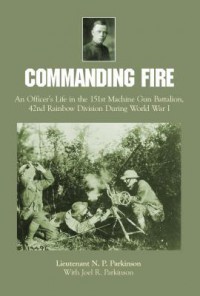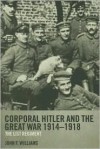Currently reading
AN UNFLINCHINGLY HONEST & SOBER ACCOUNT OF THE WWI COMBAT EXPERIENCE

As far as war memoirs go, this book is a rare gem. The author's grandson chanced upon a manuscript from the 1930s, in which the author had written down his experiences as an officer with the U.S. 42nd "Rainbow" Division during the First World War. Furthermore, the author's memoir is bolstered by footnotes provided by the editor to address any historical discrepancies that may have crept up in the memoir. After all, with the passage of time, memory sometimes becomes fallible. There are also 2 appendices that were prepared shortly after war's end by some of the author's fellow officers telling the history of the Rainbow Division and the machine gun battalion in which the author served.
"Commanding Fire" offers the reader a fairly comprehensive view into a life of a young man (N.P. Parkinson) who enlisted in the U.S. Army in July 1917, received his stateside training at Fort Sheridan, IL (where his unit was treated to an inspiring pep talk by Teddy Roosevelt), earned an officer's commission, and shipped over to Europe with his unit in early 1918.
Upon arrival in France, Parkinson's unit is given practical training and real combat experience with French forces on the Lorraine front. This was from March to June 1918, when the 42nd Division was assigned to the Champagne sector, where it took up combat operations against the Germans.
While reading "Commanding Fire", I gathered up the following quotes, which I feel give a palpable flavor of what the war was like for the average soldier:
"Plans taken from prisoners July 15th [1918] showed that the Germans had planned to be in Suippes by 9 [AM] and in Chalons by 3 [PM]. Had they succeeded it would have been impossible to save Paris, but they failed. ... We were proud of our part as a division in stopping this attack, and we could tell that the French were overjoyed to know that American troops were in the fighting lines ..."
"Tuesday, August 28th and Wednesday, August 29th [1918], we prepared for the movement forward. We had long been hearing rumors of a tremendous Allied drive to extend from Belgium to Switzerland. That evening, as the rain continued to fall, we saw another beautiful rainbow in the sky, and a rainbow means only one thing in the Rainbow Division: a battle."
"September 30th [1918], I was ordered back to D Company just as the battalion formed to march out. We knew by this movement that we were headed toward the Meuse-Argonne Drive, which was now in full swing."
"Aeroplane activity was increasing. The enemy suspected an attack in this region and was sending planes over to see what was going on. We had some planes in the air, but the enemy still had mastery in this section. On Thursday, October 31st, we were all prepared for the attack, which was set for 5:00 AM, November 1st [1918]."
"When the Armistice was signed..., all recommendations for promotion were cancelled. General MacArthur came back to his old brigade and Major General Flagler took command of the division. He had not been in any of the campaigns. The men of our division resented having a man like MacArthur denied promotion and a combat division like the Rainbow given to the command of an inexperienced general."
Of special interest to me was the role undertaken by the 42nd Division as part of the Army of Occupation, which went into Germany in December 1918. Parkinson goes to considerable lengths in detailing this aspect of the 42nd Division history. (This is a history that is generally overlooked or forgotten because there was little interest in U.S. Army circles in examining what is largely regarded as a brief, inconsequential interlude in postwar Germany.)
All in all, this is a highly readable, informative war memoir. (Joel Parkinson did a fantastic job in editing this work. His grandfather would be proud.)
 1
1













